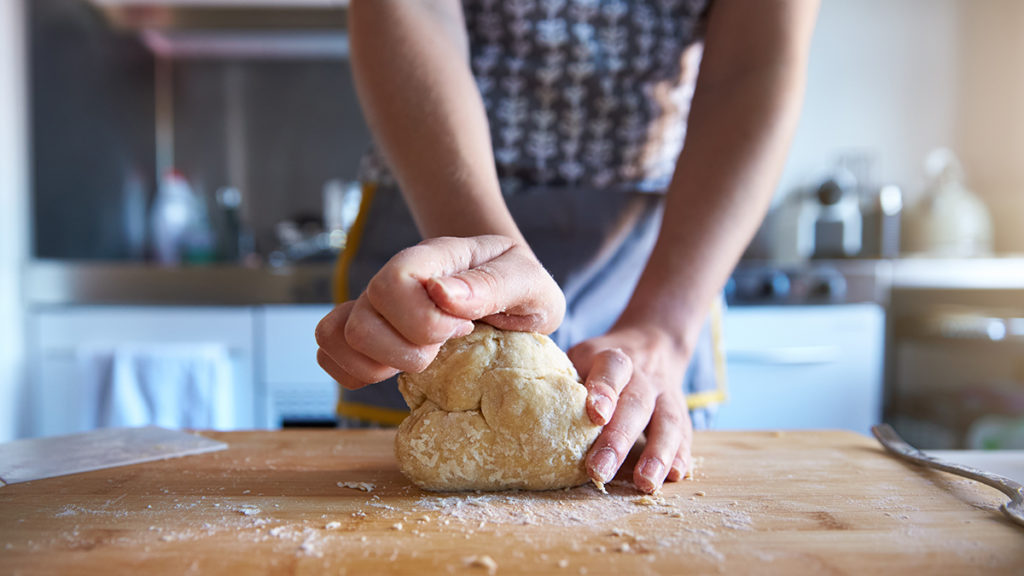How Baking Therapy Can Improve Your Quality of Life
The health benefits of turning a ball of dough into something delicious to eat are too numerous to count.
Feb 14, 2022
I recently spent a couple of staycation days in downtown West Palm Beach, Florida, which is only about an hour from my house. I love the relaxed luxury vibe of its oceanfront Rosemary Square, which features Mission Revival architecture, bougainvillea and other tropical plants lining doorways, and public art and pop-ups accenting the sustainably minded, green-focused restaurants.
But despite the most welcome getaway, I couldn't stop stressing about the stack of deadlines awaiting me at home. It was truly difficult not to spend every minute in the nearby Starbucks working instead of being soothed by the interactive water maze located in the square.
Then I found a local kitchen supply store and spent an hour shopping for cookie cutters, some badly needed oven mitts and dish towels, and other baking items, such as vanilla, almond, coffee, and chocolate extracts. I emerged refreshed and energized. Why?
Because baking, for me and many others, is therapy. Just thinking about what I'm going to create in the kitchen makes my heart stop racing when I feel out of control.
What is baking therapy?
Though not an official form of therapy, many health professionals ranging from psychiatrists to nutritionists recommend baking to ease stress, anxiety, depression, rage, and other negative emotions. Dr. Yalda Safai, a psychiatrist in New York City and contributor to the ABC News Medical Unit, says, “Baking forces us to be present in the moment, very similar to meditation. When we are completely present and focused on baking, it's like escaping the outside world for a few hours."
I completely agree. Baking is both ritualistic and specific. Because it relies on chemical reactions to make things happen, you can't, as Essence Nutrition founder Monica Auslander Moreno, MS, RDN, says, “throw caution to the wind. Baking is precise, and you have to follow the rules."
That is comforting for those who need to create order out of chaos, a category that includes many of us right now. It also explains the explosion of chocolate chip cookies and sourdough bread we saw on Instagram and Facebook during the first year of the pandemic.
How does baking therapy work emotionally?
Baking incorporates repetitive motions, such as mixing, kneading, and decorating, that many people find soothing, Dr. Safai notes. I find this to be accurate as well. Baking with yeast is also a great stress reliever. After all, there's nothing like punching down a dough when you're angry. It's a safe and satisfying way to release rage into an inanimate object, and you get the benefit of eating a preservative-free bread afterward. That brings with it a sense of accomplishment.

Those who post the results on social media find gratification from the accolades of others who admire their work. But you don't have to go that far to achieve a sense of worth. Family and friends complimenting the final product, or even just your dog sniffing the sweetly scented air, is enough to tell you that you're doing a good job.
In addition, Safai says, “all senses are stimulated during baking; touch, smell, taste, sight, and hearing." Sensory stimulation improves your neurocognitive connections and boosts your mood in ways that aren't apparent. But the outcome surely is.
How does baking therapy help you mentally?
Baking requires concentration. It forces you to focus on not missing a step or mismeasuring an ingredient. In turn, this creates a feedback loop that improves your concentration in other areas. "By engaging in activities that require focus for long periods of time, one can promote creativity, problem-solving skills, and decrease stress associated with multitasking," Safai says. "Baking is a great exercise for improving focus and concentration."

That doesn't mean the recipes you follow have to be difficult. In fact, you don't even need a recipe. Simply taking ready-made cookie dough and scooping it into squares or circles and decorating it however you want can be therapeutic — and, according to Moreno, fun and educational for the whole family.
“You can add fruits like bananas and berries on top and talk [to your kids] about the benefits of phytonutrients," she says. “You can also mix in cinnamon and other anti-inflammatory spices that help the body."
How does baking therapy help you physically?
Baking isn't thought of as a creative exercise — it's more rooted in science and procedure — but it certainly can be. Moreno advises experimenting with recipes and using different ingredients in the kitchen to spark your imagination and bring more healthful elements to your baked goods. The amount of alternative ingredients to use in food has proliferated, and those with special dietary needs, in particular, have a growing list of options with which to bake — especially when it comes to non-traditional flours and sweeteners, such as those found in gluten-free and sugar-free cookies.
Beyond just nutritional content, the act of baking has its own set of physical health benefits.
“Not thinking about minutiae and anxiety and instead being laser focused on the task at hand lowers cortisol and inflammatory hormones, and reduces ill metabolic effects," Moreno says.
Safai adds, “Since baking is a lot like meditating, which works as the powerhouse for stress relief, it, in turn, lowers blood pressure and heart rate. It also helps release endorphins, such as dopamine and serotonin, both of which increase happiness."
I can attest to that. When I returned home from West Palm Beach, I put my new heart-shaped cookie cutters to use on some cut-out cookie dough, pulled the cookies out of the oven with my fresh, clean oven mitts, and set to work icing them. And I felt, well, great.







